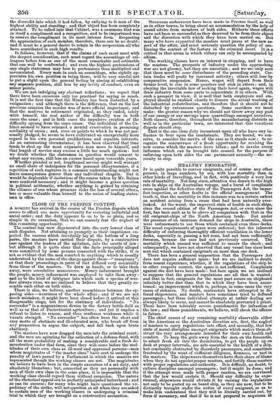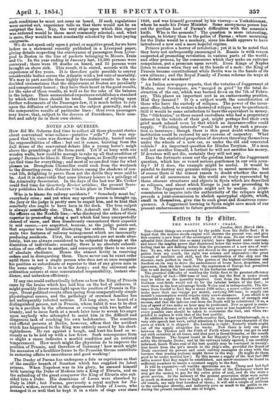HEALTHY EMIGRATION. .
Jr is quite possible to convey emigrants, and of course any other persons, in large numbers, by sea, with less mortality than in other kinds of travelling, and in fact, with positively a very low rate of mortality. Not long since, attention was drawn to the high rate in ships on the Australian voyage, and a burst of complaints arose against the defective state of the Passengers Act, the imper- fect inspection, or other faults in the official management. The truth is, that the mortality in this instance was to a certain extent an accident arising from a cause that had been naturally over- looked. At the worst, the improved state of health in such ships, since the second edition of the Passengers Act, or even since the first, has been such as to be above all comparison with that in the old emigrant-ships of the North American trade. But under the pressure of an immense demand for ships to Australia, there were inducements to use those which contained even three decks. The usual requirements of space were enforced; but the inherent difficulty of enforcing thoroughly efficient ventilation in the lower decks, especially in passing a hot zone, had not been sufficiently foreseen, because the case had not previously occurred. The mortality which ensued was sufficient to secure the check; and subsequently, we have not observed that any vessel has since been sent out which contained emigrants on more than one deck.
There has been a general supposition that the Passengers Act does not require sufficient space : but we are inclined to doubt, from recent experience, whether, if the regulations of the ship be in other respects correct, the space is not sufficient Complaints against the diet have been made : but here again we are inclined to suppose that the general regulations are all that is wanted; and that in fact, emigrants for the most part secure on shipboard infinitely better diet than that to which they have been accus- tomed: an improvement which is, perhaps, in some eases the -very cause of sickness. No doubt, contractors have attempted to de- fraud shipowners, and masters have sometimes tried to defraud passengers ; but these individual attempts at unfair, dealing are always likely to occur, and cannot be absolutely prevented t priori. There have been tolerably severe punishments for infraction of the law ; and those punishments, we believe, will check the offence in future.
The chief causes of any remaining mortality observable either, in the American or the Australian direction are, first, the neglect of masters to carry: regulations into effect, and secondly, that low state of moral discipline amongst emigrants which makes them ob- struct the very arrangements intended for their own health and comfort. To 'keep the girls away from the men on the forecastle, to admit fresh air into the dormitories, to get the people up on deck at proper interval's, are acts essential to the health of a fillip, but constantly obstructed by disorderly passengers, and sometimes frustrated by the want of sufficient diligence, firmness, or tact in the masters. The shipowners themselves have their share of blame when they do not appoint proper masters, and fortify those masters with proper regulations and authority. It is difficult, no doubt, to enforce discipline amongst passengers;' but it might be done; and if the attempt were made with proper caution, we are convinced that the law would sustain it. Should any difficulty be expe- rienced, shipowners would obviate it by causing the regulations not only to be posted up on board ship, as they are now, but to be distinctly brought under the notice of every emigrant, so as to make him understand that they will be literally carried out, by force if necessary, and that if he is not prepared to acquiesce in
such conditions he must not, come on board.. If such regulations were carried out, experience tells us that there would not be an emigrant the less. Nay, the very ships upon which this rigour was enforced would be those most commonly selected; and, what is more, they would be most constantly selected by the best-paying emigrants. We do not speak only upon d priori or negative proof, for we have before us a statement recently published in a Liverpool paper, giving details respecting the conveyance of passengers from Liver- pool to Boston in the line of packets belonging to Messrs. Train and Co. In the year ending in January last, 13,506 persons were conveyed ; there were 38 deaths on board, and 25 persons were brought on shore sick. This result, it is stated, accords with the experience of five years. It is therefore quite possible to convey considerable bodies across the Atlantic with a low rate of mortality. Itre may in part ascribe these highly favourable results to the un- doubted circumstance that the shipowners at Boston are peculiarly and conspicuously honest ; they have their heart in the good results, for the sake of those results, as well as for the sake of the balance in the ledger. Their accumulated experience establishes a standard by which other lines should be tried. Instead of relying upon further refinements of the Passenger-law, it is much better to rely upon the diffusion of information on the subject generally, and on the comparative results of particular lines : thus even passengers may know, that, subject to the decrees of Providence, their com- fort and safety lie in their own choice.



































 Previous page
Previous page